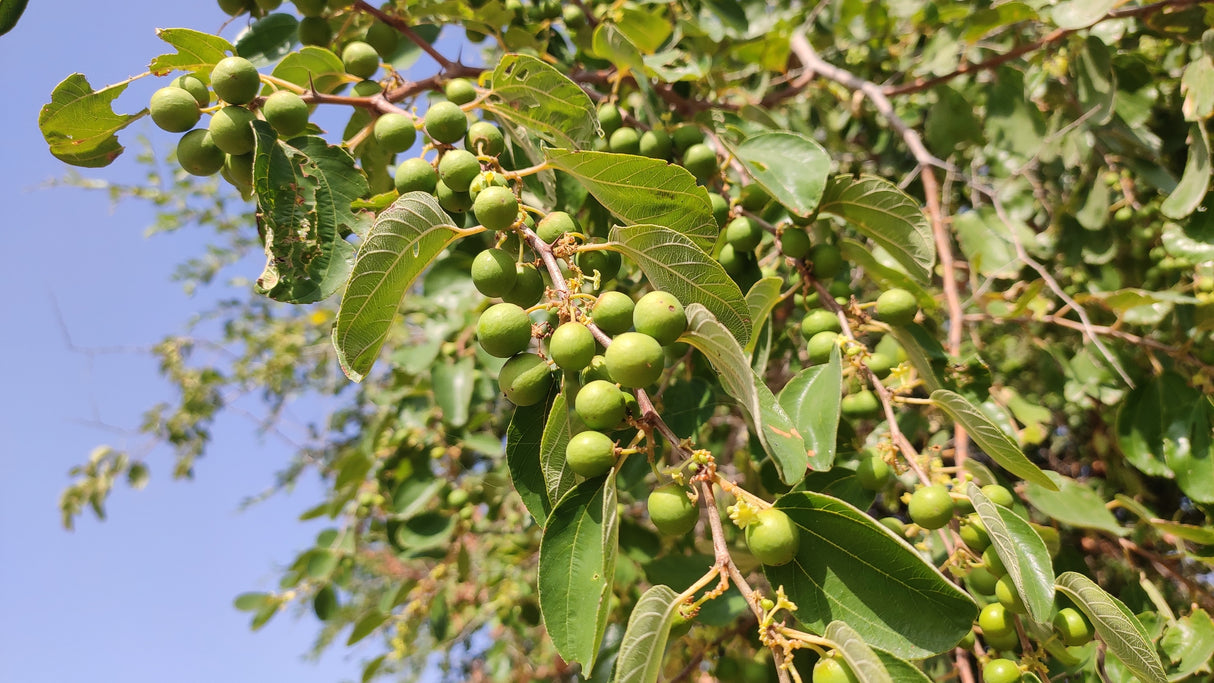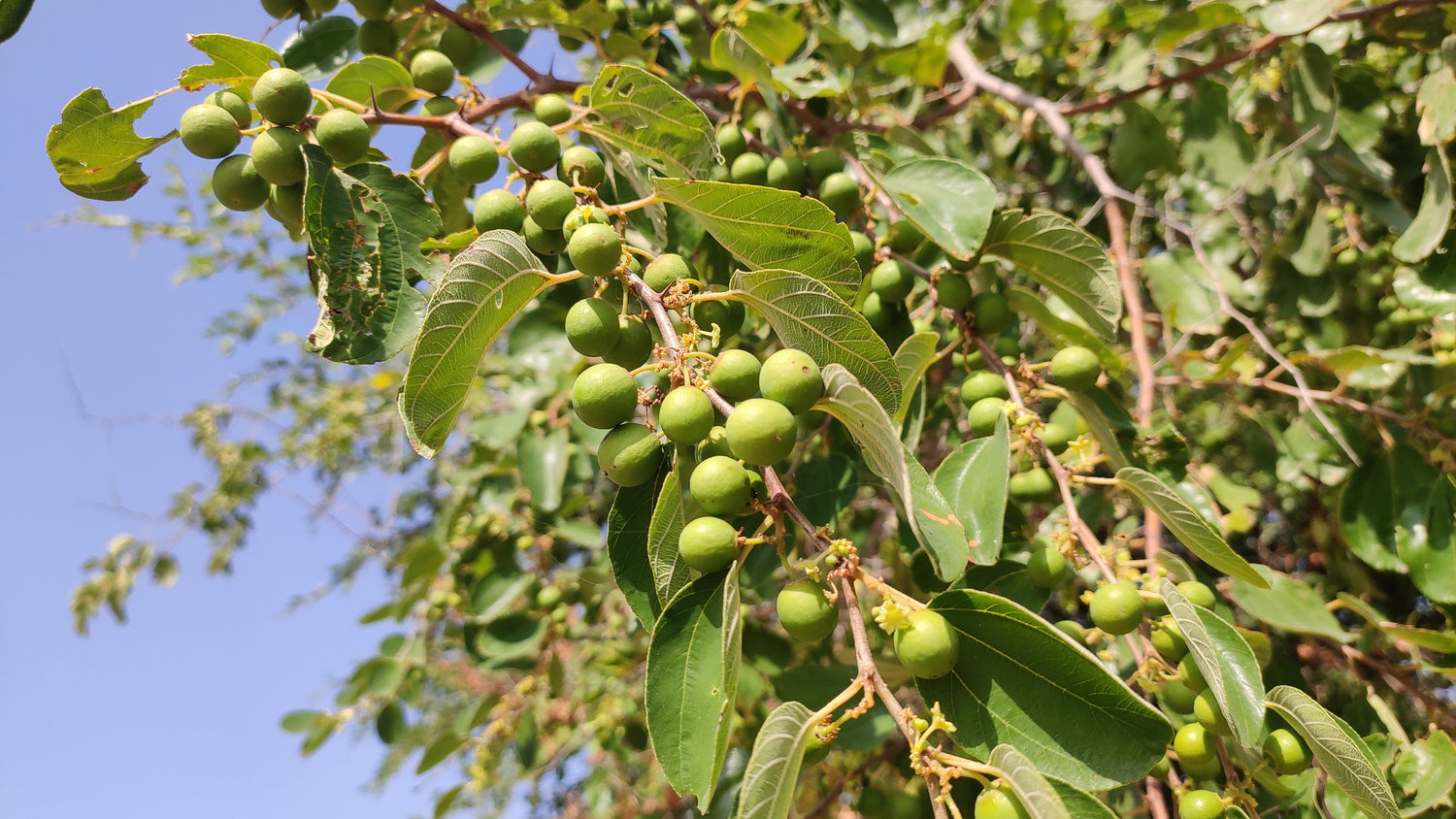Description
Description
The Ziziphus nummularia, commonly known as Jharber or Wild Jujube, is a hardy, drought-resistant shrub or small tree native to arid and semi-arid regions. It features spiny branches and small, glossy green leaves that form a dense, rounded crown. The plant produces small, edible, round fruits that are highly nutritious and often used in traditional medicine and culinary applications.
This resilient species is ideal for erosion control, reforestation, and agroforestry in challenging conditions, offering both ecological and economic value.
Specifications:
- Height: 1–4 meters
- Width: 2–3 meters
- Native to: Indian subcontinent, Middle East, and North Africa
- Foliage: Small, oval, glossy green leaves; deciduous
- Growth rate: Moderate
Conditions:
- Soil: Thrives in sandy, rocky, and poor soils; tolerant of saline conditions
- Light: Full sun
- Water: Low; highly drought-tolerant once established
- Climate: Thrives in arid and semi-arid regions; tolerant of extreme heat
Additional Features:
- Flowers: Small, yellowish-green flowers bloom in clusters during the warm season
- Fruits: Small, round, reddish-brown edible fruits; used in traditional medicine and food
- Uses: Ideal for erosion control, hedging, livestock forage, and reforestation projects
- Spacing: Plant 2–3 meters apart for dense hedges or windbreaks
- Low Maintenance: Requires minimal care; thrives in harsh conditions
- Pest Resistance: Generally pest-resistant; benefits from well-drained soils
- Seasonal Appeal: Fruits provide seasonal interest and nutritional value
- Versatility: Suitable for agroforestry, desert gardens, and sustainable landscaping
The Jharber is a versatile and resilient plant that contributes to biodiversity, supports livelihoods, and thrives in challenging environments, making it an invaluable addition to arid and semi-arid
Delivery Information
Delivery Information
We offer flexible delivery options to ensure your tree arrives in perfect condition, whether you're located nearby or on the other side of the world.
- Domestic Deliveries:
We provide reliable delivery services across the country, utilizing our fleet of specialized trucks and train freight networks. Whether you're in a metropolitan area or a remote location, we ensure your trees arrive safely and efficiently. - International Deliveries:
For our global customers, we coordinate delivery via sea freight. With 30+ years of exporting experience, every tree is carefully prepared to meet international biosecurity standards and packaged for safe transport to its destination.
Our team will work closely with you to arrange the most suitable delivery method based on your location, project timeline, and tree size. No matter where you are, we ensure a seamless delivery experience.
Have additional questions? Contact us to discuss your specific delivery requirements!
FAQ's
FAQ's
How are ex-ground trees prepared for delivery?
All ex-ground trees are carefully dug with their rootball intact to preserve the root system and minimize transplant shock. Each tree is stabilized and treated with specialized solutions to promote health during transit. The rootball is wrapped to retain moisture and protect it from damage, and water crystals are added to provide essential nutrients and hydration for the journey. These meticulous preparations ensure your tree remains healthy and ready for planting, whether it’s traveling across the country or overseas.
How long does delivery take?
Delivery times vary depending on your location and the size of your order. Domestic deliveries typically take 1–2 weeks, while international shipping may take several weeks depending on the destination. Contact us for specific timelines.
Are there minimum order quantities for delivery?
For local and nationwide orders, there are no strict minimums, though delivery costs may vary based on order size. For international orders, a minimum quantity is often required to optimize freight efficiency. Contact us to discuss your needs.
Do you provide installation services?
While we focus on the supply and delivery of trees, we can connect you with trusted landscaping partners who specialize in tree installation and site preparation.
Can I visit your farms to select trees?
Yes, we welcome visits to our farms by appointment. Seeing the trees in person allows you to select the perfect specimens for your project. Contact us to schedule a visit.



 Inspection available upon request
Inspection available upon request
 Photos are of example stock
Photos are of example stock
 International Delivery Available
International Delivery Available
 Available For Export
Available For Export
